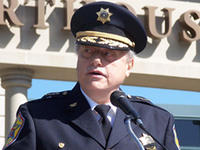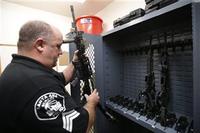-
Napolitano’s arguments about border security undermined by rise in arrests

As recently as last Thursday, DHS secretary Janet Napolitano said that border security is at its most robust in years. New numbers released on the same day tell a different story about activity on the border: arrests on the border are up 13 percent compared to this time last year, from 170,223 last year to 192,298 this year. Napolitano argues that arrests alone are not a reflection of how secure the border is, and that crime statistics in border regions – a better measure of border security, she says — are down from previous years.
-
-
Maryland’s new firearms safety law requires fingerprinting gun buyers

The Maryland House of Delegates passed a new law on Wednesday which will require the fingerprinting of gun buyers, mandate background checks, restrict availability of weapons to the mentally ill, and ban certain kinds of assault weapons and magazines of more than ten bullets.
-
-
U.S. prosecutor leaves Texas Aryan Brotherhood case due to safety concerns

A federal prosecutor in Houston has withdrawn from a racketeering case involving the Aryan Brotherhood of Texas. Assistant U.S. attorney Jay Hileman left the case due to concerns over his and his family’s safety after a Kaufman County district attorney and an assistant attorney were killed in two separate incidents. It is not known whether Hileman and his family were specifically threatened.
-
-
Georgia town requires households to have firearms

Nelson, a Georgia town of fewer than 2,000 people, has passed a mandatory gun ownership law in an effort to lower the town’s crime rate. The city council unanimously passed the Family Protection Ordinance on Monday, requiring “heads of households to maintain firearms … in order to provide for the emergency management of the city.”
-
-
NYPD issues strict guidelines for use of social media by officers
The New York Police Department (NYPD) has issued strict guidelines for employees using social media, and ordered its employees to take a second look at their profiles on Facebook, Twitter, and other social networking sites to ensure they conform to the new rules. The NYPD follows other police departments around the country in insisting that police officers draw a clearer line between their private life, as reflected in their social media postings, and their official duties.
-
-
Spotting potential killers, rather than armed guards, would make schools safer: study

Tragedies involving children, such as the one at Sandy Hook Elementary School, fuel outrage and calls for immediate action to prevent similar atrocities. Lawmakers are debating different gun control measures, while the National Rifle Association’s unveiled a plan – the National Shield School Proposal — which calls for placing armed guards at schools. Three criminal justice researchers argue that the NRA’s proposal is problematic, expensive, and would not be effective. The researchers say there is evidence to show that in the majority of school shootings, the assailant suffered from some type of mental health issue, dysfunctional family, problems at school, social isolation, and in some instances, bullying. The article authors suggest that it is these issues that are the root cause of these tragedies, and that in order to prevent school violence, society must address troubled youth.
-
-
Aryan Brotherhood suspected in Texas prosecutors killings

The FBI and other law enforcement agencies believe the white supremacist group the Aryan Brotherhood could be behind the murders of a Texas district attorney and his wife last weekend, and the death of an assistant district attorney earlier this year.
-
-
Pervasive surveillance threatens privacy, gives power advantage to the watcher

Surveillance is everywhere, from street corner cameras to the subject of books and movies. A researcher says that pervasive surveillance menaces our intellectual privacy and it gives the watcher a power advantage over the watched, which can be used for blackmail, persuasion, or discrimination.
-
-
FBI wants 1994 online surveillance law updated
The FBI said the agency’s top priority this year is to update a surveillance law so authorities can monitor in real time Web activities of Americans suspected of committing crimes. The 1994 law, known as the Communications Assistance for Law Enforcement Act (CALEA), applies to telecommunication companies, but only partially to Web-based companies.
-
-
Debate in California over reward money for killer’s finders
Several donors in California have pulled back their portion of a $1 million reward which was offered for information leading to the capture and conviction of Christopher Dorner, who went on a 10-day shooting spree and killed four people, including Riverside police officer Michael Crain, earlier this year. The donors who pulled back their pledges say the criterion for the reward has not been met because Dorner killed himself. Those donors who have decided to pay up say it would be disingenuous not to honor the reward pledge.
-
-
DHS agent charged with sharing child porn
A DHS agent was charged and arraigned in San Francisco on Tuesday for possessing child pornography. The large number of material prompted DHS Security to launch a lengthy investigation.
-
-
Pennsylvania Sheriff charged for making terrorist threats

A Pennsylvania sheriff was arrested and charged Monday for threatening to chop off a Democratic campaign worker’s hands, shoot a reporter, and intimidate witnesses.
-
-
DHS denies plan for large ammunition buy

DHS announcement that it was planning to buy 1.6 billion rounds of ammunition over the next five years was greeted with questions by some and a sense of alarm by others. Now DHS is explaining its move.
-
-
Police departments report difficulties buying ammo

Local law enforcement agencies around the country are finding it hard to buy ammo these days. The shortage is in part due to gun owners stocking up on bullets due to concerns about new gun laws at the federal and state levels. DHS plan o buy 1.6 billion bullets only adds to the ammo shortage.
-
-
Gun manufacturer to leave Colorado after governor signs gun bill

Colorado governor John Hickenlooper on Wednesday signed a state gun control bill which will expand background checks and limit ammunition magazine capacity. The measure is notable because Colorado has been considered a firearm-friendly state.
-
More headlines
The long view
How Male Grievance Fuels Radicalization and Extremist Violence
By Haily Tran
Social extremism is evolving in reach and form. While traditional racial supremacy ideologies remain, contemporary movements are now often fueled by something more personal and emotionally resonant: male grievance.
